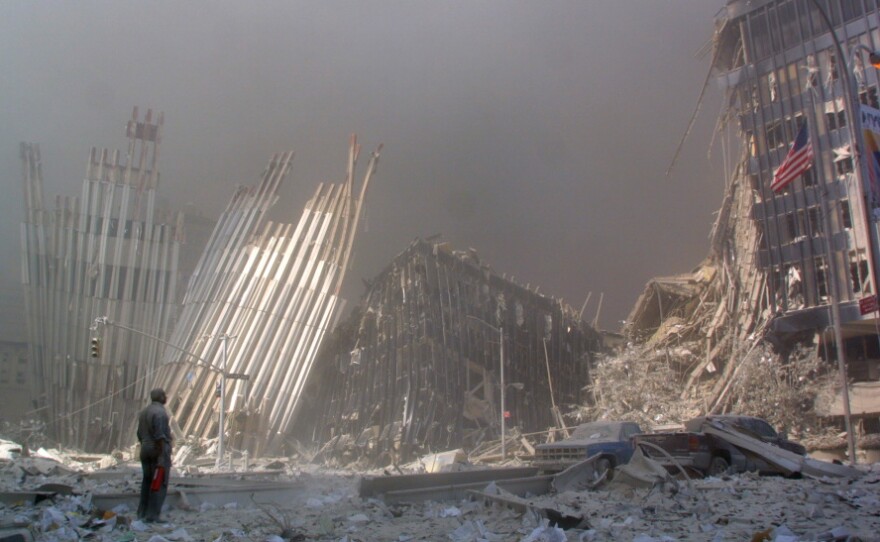As President Obama visited ground zero Thursday, accompanied by former New York City Mayor Rudolph Giuliani, the ceremony offered some reminders of the feelings of unity that swept the nation after the terrorist attacks of Sept. 11, nearly 10 years ago.
The feelings then were so strong that it became an instant cliche — the notion that "Sept. 11 changed everything." It has been expounded by countless pundits and politicians, as well as forming the basis of everything from the title of academic papers to jokes on the raunchy cartoon show Family Guy.
But in the wake of the killing of al-Qaida terrorist leader and Sept. 11 mastermind Osama bin Laden, it is becoming clearer that while the attacks changed America profoundly, they didn't change "everything." And what they did change, they didn't necessarily change alone.
"The shock of the news of bin Laden's death was in part a measure of how little the war on terrorism affects the lives of most Americans day to day apart from those with friends and loved ones who are in combat abroad," says Sean Wilentz, a Princeton University historian.
America is by all accounts a different place than it was a decade ago. The 2001 attacks on the World Trade Center and the Pentagon led directly to the ongoing war in Afghanistan and became part of the casus belli in Iraq.
But while bin Laden and the threat of international terrorism that he symbolized had a major effect on attitudes about privacy, civil liberties and immigration — to cite a few examples — these areas of American life also were altered in response to a confluence of other trends, observers say.
Lower Expectation Of Privacy
Airport security was already getting stricter in the period following the first Persian Gulf War. But passengers forced to take off their shoes before boarding airplanes largely have bin Laden to blame. Each successive attempt to use planes as weapons — the shoe bomber, the underwear bomber — has led to new measures being introduced at airports.
And perhaps the most persistent policy debate reopened by the Sept. 11 attacks is the need to balance such security and surveillance efforts against privacy and civil liberties.
Bin Laden's death itself has resurfaced the question of whether torture is a necessary or even effective means of gathering actionable intelligence.
Those who argue that security concerns must trump individual liberties have, for the most part, carried the day so far, experts say. The U.S. government has set up a vast protective apparatus since Sept. 11. Security and surveillance agencies around Washington now take up far more square footage than does the entire Pentagon.
"Searches have been done in the broadest meaning of the term, with the government having much less need to justify them to the judicial branch than was the case before 9/11," says David K. Shipler, author of The Rights of the People: How Our Search for Safety Invades Our Liberties.
Most Americans view electronic surveillance as being less intrusive than physical frisking by police, Shipler says. That has led to an erosion of the zone known legally as the "expectation of privacy," which refers to settings in which people can reasonably expect that their actions won't be monitored by law enforcement absent a warrant.
But even a civil libertarian like Shipler, who believes that portions of the post-Sept. 11 Patriot Act should be reconsidered, says that American notions about privacy have been shifting anyway, owing to the growth of the Internet and constant electronic communication.
The combination of security threats and the march of technology, Shipler says, "have made us less conscious of the boundary between our public and private information."
Effects On Immigration
Concerns about international terrorism also have altered, in part, policies surrounding immigration — particularly when it comes to incarceration and deportation, says Edward Alden, author of The Closing of the American Border.
The shock of the news of bin Laden's death was in part a measure of how little the war on terrorism affects the lives of most Americans day-to-day apart from those with friends and loved ones who are in combat abroad.
"Before 9/11, the standard practice when an illegal immigrant was arrested was to give them a court date, and a lot of them never showed up," he says. "This was largely an accepted thing, but as a result of 9/11, this became seen as a security threat."
But illegal immigration would have risen to the fore as an issue irrespective of terrorism, Alden says. Illegal crossings and arrests along the Southern border had peaked in 2000, he says. And most of the debate about immigration concerns economic migrants, not national security risks.
"You already had the public and politicians primed to support tough measures to reduce immigration," he says. "Because of 9/11, the security threat got thrown in."
Putting Bin Laden To Rest
That may be the enduring legacy of bin Laden in America — the sense that tighter security is needed to offer protection against sudden, unexpected threats. The desire clearly was strong in the country to respond in highly visible and forceful ways to bin Laden and his minions with box cutters.
Although some advocacy groups are saying that his death offers the occasion to reconsider the Patriot Act, few people expect that the government will soon shut off the security cameras or box up the body scanners.
"The attack changed the country, and he was the architect of that," says Philip Zelikow, who served as executive director of the 9/11 Commission. "It's opened up a psychic wound that has been slow to heal, although this ... [bin Laden's death] ... will help the process."
Copyright 2022 NPR. To see more, visit https://www.npr.org. 9(MDAzMjM2NDYzMDEyMzc1Njk5NjAxNzY3OQ001))






